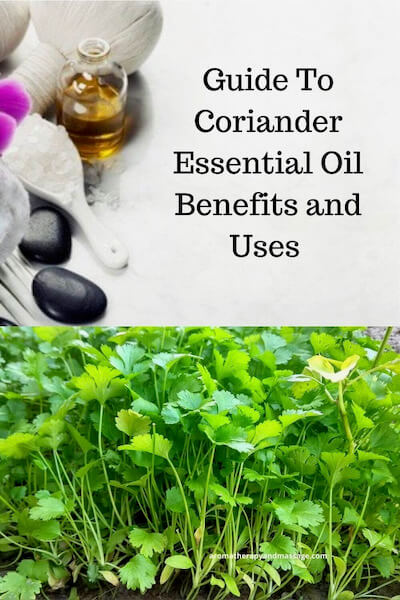- Home
- Essential Oil Profiles
- Coriander Essential Oil
As an affiliate for Bookshop, Amazon, and other programs, I may earn a small commission for products purchased through links. This doesn't affect the price you pay. Privacy policy and disclosures.
Search this site:
Guide to Coriander Essential Oil Benefits and Uses
Coriander essential oil is gentle and compassionate and intertwines with the depths of human nature, according to aromatherapist Valerie Ann Worwood in Aromatherapy For the Soul. She says the emotional benefits of coriander (Coriandrum sativum) are to encourage creativity, imagination, good memory, confidence, motivation, optimism, sincerity, expressiveness, and enthusiasm.

The most common type of coriander oil is made from the seeds, and you may see it called coriander seed essential oil. It is an invigorating, stimulating oil, often noted for its use in aiding digestion and helping relieve aches, pains, and arthritis.
Another oil is made from the leaves of the plant and may be called coriander leaf essential oil, cilantro oil, or cilantro leaf oil—cilantro and coriander are the same plant. The availability of the leaf oil is limited, and it has no established therapeutic uses, according to Robert Tisserand.
The focus of this profile is coriander seed essential oil.
Basic Coriander Facts
Plant family: Apiaceae
Production: Coriander seed essential oil is steam distilled from crushed ripe seeds.
Aroma: Sweet, herbaceous, spicy, and slightly fruity or floral.
Perfume/Aromatic note: Middle
Is coriander safe to use during pregnancy? Maybe. Consult a professional.
Is coriander essential oil safe for children? Yes.
Cautions: No known hazards or contraindications, according to Essential Oil Safety, 2nd Edition.
Main components of coriander seed oil:
- linalool 59.0–87.5%
- alpha-pinene 0.1–10.5%
- gamma-terpinene 0.1–9.1%
- beta-pinene 0.1–8.6%
The main component of the leaf oil is (E)-2-Decenal, at 26.8–46.5%.
Source: Essential Oil Safety, 2nd Edition
Coriander Aromatherapy Benefits
Aromatherapy: A Complete Guide to the Healing Art: Coriander essential oil may help relieve inflammation, joint pain, headaches, flu, gas, and diarrhea. Emotionally, the oil is uplifting and motivating and relieves stress.
Advanced Aromatherapy: The Science of Essential Oil Therapy: Coriander is strengthening and promotes digestion. The oil may cause a mild feeling of euphoria.
The Complete Book of Essential Oils and Aromatherapy: Use coriander to help relieve digestive problems, such as flatulence, bloating, indigestion, abdominal discomfort, and IBS. The oil is also useful for dealing with nervous tension, muscle fatigue, muscle aches and pains, mental fatigue, feeling tired all the time, and emotional exhaustion.
375 Essential Oils and Hydrosols: Use coriander to relieve stress, ease anxiety, and reduce insomnia. As part of a massage oil, this essential oil may help ease arthritis pain and migraine headaches.
The Encyclopedia of Essential Oils (updated edition): Coriander may help relieve fluid accumulation, arthritis, gout, muscle aches and pains, poor circulation, rheumatism, stiffness, colic, indigestion, flatulence, nausea, hemorrhoids, digestive spasm, colds, flu, migraine, neuralgia, and nervous exhaustion.
Aromatherapy For Healing the Spirit: In Traditional Chinese Medicine the energy of coriander is warm and dry. This essential oil circulates Qi-energy in the stomach and is useful for calming digestive spasms, improving poor appetite, and relieving indigestion, flatulence, and bloating. The oil can also help reduce the pain of arthritis, rheumatism, and neuralgia, while also relieving general debility, nervous exhaustion, and mental fatigue.
Aromatica: A Clinical Guide to Essential Oil Therapeutics, Volume 2: Psychologically, coriander promotes emotional stability, integration, self-confidence, and courage. Physically, the essential oil restores hypotonic/weak conditions and stimulates cold conditions. In Traditional Chinese Medicine the essential function of the oil is to nourish the Blood, harmonize the Middle Warmer, and strengthen the Shen.
- The rasa (taste) of coriander is bitter, pungent, sweet; the vipaka (aftertaste) is pungent; and the virya (energy) is cooling/moisturizing.
- The oil decreases vata, kapha, and pitta.
- Tissues most affected by the oil are plasma, blood, and muscle.
- Indications for this essential oil include hay fever, allergies, indigestion, vomiting, and sore throat.
The Magic of Ayurveda Aromatherapy (by Farida Irani) adds that uses for the oil include gout, general pain, digestive support, fungus, stretch marks, and scars. Emotionally, the oil is calming and helps relieve insomnia, stress, and dizziness.
The Essential Guide to Aromatherapy and Vibrational Healing: Spiritually, you can use coriander to cleanse your aura. Mentally, the essential oil improves memory and mental clarity and helps you concentrate. Emotionally this oil helps you get rid of emotional baggage clogging your emotional body and preventing healthy relationships.
Aromatherapy and Subtle Energy Techniques: Coriander promotes enthusiasm, optimism, and healing. The oil is especially useful for the second chakra to promote creativity, spontaneity, and passion and to help heal relationship issues.
Mixing Essential Oils for Magic: Coriander supports divination, clairvoyance, and accessing memories. Use the oil to find a lover and excite passion. The essential oil protects against negative influences, especially in the home, bringing peace and security.
Coriander Essential Oil Uses and Blends
Sensual Massage Oil
- 3 drops coriander essential oil
- 2 drops rose essential oil
- 2 drops sandalwood essential oil
- 1 tablespoon carrier oil
Source: Rocky Mountain Oils
Tension Reducing Bath
- 3 drops coriander
- 3 drops sweet orange essential oil
- 1/2 cup Epsom salt
- 1 teaspoon carrier oil
Blend all ingredients. Stir the blend into a warm bath. Source: Plant Therapy
Bedtime Body Butter
For emotional balance and relaxation, make a body butter using coriander and lavender, according to Aromatics International.
Aromahead suggests the following blends:
Mental Clarity Diffuser Blend
- 4 drops coriander
- 2 drops rosemary essential oil
- 2 drops peppermint essential oil
Quick Action Digestion Inhaler
Use this inhaler for indigestion, cramping, and other discomfort from something you’ve eaten. Drop the oils onto the wick of an aromatherapy inhaler:
- 8 drops coriander
- 4 drops bergamot essential oil
- 3 drops ginger essential oil
Joint Pain Relief Oil
- 2 tablespoons Trauma Oil (a carrier oil infused with arnica, St. John’s wort, and calendula)
- 9 drops coriander
- 9 drops juniper essential oil
Pour the Trauma Oil into a 1-ounce (30 ml) glass bottle. Add the essential oils. Shake gently. Use as needed.
Buy essential oils: Aromatics International or Rocky Mountain Essential Oils.
Photo Credit: ShahadatHossain, CC BY-SA 4.0, via Wikimedia Commons



